The forum brought together global leaders from the information and communications technology (ICT) sectors, from both at home and abroad. It allowed them to discuss the future of and their visions for ICT, as well as share ideas on trends in ICTs.
Those in attendance included Second Vice Minister of Science, ICT and Future Planning Yoon Jong-lok, Vice President of Cisco Robert Pepper, CEO of IBM Korea Shirley Yu-Tsui, Murat Sonmez, managing director of the World Economic Forum (WEF), and CEO of the Israeli-based SNS Enterprises Viber Talmon Marco, as well as other world-class experts and CEOs.

Robert Pepper, vice president of Cisco, gives the keynote speech during the Global ICT Premier Forum, held as part of the ongoing ITU Plenipotentiary Conference in Busan, on October 27. (photo courtesy of the ITU Plenipotentiary)
The forum began with a keynote speech by WEF managing director Murat Sonmez, a speech that focused on the opportunities in and forecasts for the creative industries.
Robert Pepper, vice president of Cisco, a U.S.-based ICT corporation, pointed at the “Internet of Things” (IoT) as the main tool that could lead the creative industries. As he put it, turning data available on the Internet into information and then into knowledge is more important than merely using data itself.

Global ICT leaders and experts attend the Global ICT Premier Forum in Busan on October 27. (photo courtesy of the ITU Plenipotentiary)
“Analyzing data and transforming them into insights of our own brings great opportunities,” Pepper said. “This is the path to the creative industries and the creative society that the Korean government is trying to move toward.”
He also pointed out that, “Busan, the host city of the ITU Plenipotentiary Conference, is a big city with 3.5 million people and a port city that attracts many tourists, from both at home and abroad. Considering all these things, Busan has great potential to further grow, whether it be economically, socially or in terms of becoming more environmentally friendly, only if it makes use of the IoT to transform itself into a 'smart city' based on the IoT, as Hamburg, the port city of Germany, did.”

CEO of IBM Korea Shirley Yu-Tsui delivers her remarks under the theme of, “The future of enterprises lies in their customers,” during the Global ICT Premier Forum in Busan on October 27. (photo: Yonhap News)
Meanwhile, Shirley Yu-Tsui, CEO of IBM Korea, emphasized the growing power of consumers that has an influence on the growth of enterprises, as she delivered her speech on the theme of, “The future of enterprises lies in their consumers.”
“The era has come where consumers make or break a company. To survive, companies should listen to their customers and should become something 'needed' by its customers,” the CEO said.
“In this regard, they must involve their customers in their business and take advantage of their business methods to distinguish themselves from others. At the same time, companies should invest in not only embracing such influence from the customers, but also come up with new technologies to live up to them,” she stressed.
Second Vice Minister of Science, ICT and Future Planning Yoon Jong-lok, too, presented a speech in which he emphasized the need to lay the foundation for the creative industries using ICT.
“President Park Geun-hye launched the Ministry of Science, ICT and Future Planning to pave the way for the creative industries. To create a creative economy requires proper conditions, just as rich soil and seeds are needed in agriculture,” the vice minister said. “Given the fact that the ICT sector produced USD 88 billion worth of trade surplus last year, we have already solidified our foundation in the ICT field,” he added.

Second Vice Minister of Science, ICT and Future Planning Yoon Jong-lok speaks about his vision for the way in which ICT could help the creative industries, during the Global ICT Premier Forum in Busan on October 27. (photo: Yonhap News)
He continued to say that, “Many people call the post-war rapid development of Korea a, ‘miracle on the Hangang River,’ but I believe it is the result of its renovation. Likewise, the creative industries are not just the core economic policy for which the Korean government pushes, but a new paradigm of renovation for the Korean economy.”
By Sohn JiAe
Korea.net Staff Writer
jiae5853@korea.kr